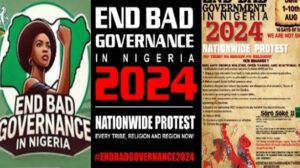See Names of Several Groups that Withdraw from Nationwide Protests Amid Calls for Restraint
See Names of Several Groups that Withdraw from Nationwide Protests Amid Calls for Restraint

Several groups have announced their withdrawal from the planned nationwide protests against economic hardship, initially set to begin in August 2024. On Friday, more organizations decided to pull out, citing various concerns.
Prominent figures, including Vice President Kashim Shettima, Minister of State for Petroleum Resources Senator Heineken Lokpobiri, Tantita Security Services Chairman High Chief Government Ekpemupolo (Tompolo), Women Affairs Minister Uju Kennedy-Ohanenye, and Asari Dokubo, have appealed for restraint. Despite these appeals, the Take It Back Group has insisted on proceeding with the protests and demanded that the Minister of the Federal Capital Territory, Nyesom Wike, provide facilities at Eagle Square.
Human rights activist and Senior Advocate of Nigeria, Ebun Adegboruwa, has requested security from Inspector General of Police Egbetokun, emphasizing that the protesters would be exercising their constitutional rights.
Many civil society groups have withdrawn from the protests. In the South West, the League of Yoruba Youths for Advocacy and Good Governance, representing 94 youth groups, decided to opt out after a meeting of leaders with a reported membership of over 55 million across Nigeria. In Kaduna, the Kaduna Concerned Group also distanced itself from the protests, dismissing them as lacking direction and choosing to support the government while awaiting improvements. Similarly, the Enugu Innovative Youths in the South East expressed concerns about exacerbating security issues and the potential for the protests to be hijacked, drawing on experiences from the 2020 EndSARS protests.
The Southern Kaduna Peoples Union (SOKAPU) echoed these sentiments, noting recent security improvements in their region as a reason to abstain from the protests. Women led by the Women Affairs Minister and former militant Asari Dokubo, along with the Nigerian Labour Congress and Trade Union Congress in Bauchi State, also distanced themselves from the protests.
Senator Heineken Lokpobiri called for calm, urging Nigerians, especially youths in the Niger Delta, to avoid participating in the protests. Lokpobiri highlighted the federal government’s understanding of citizens’ concerns and emphasized the need for constructive engagement over protests.
Tompolo, in a statement, appealed for patience with President Tinubu’s administration, noting that the economic hardships predate the current government. He stressed that the timing of the protest was detrimental and that there were security risks of it being hijacked.
The Enugu Innovative Youths reiterated their call for calm, highlighting the positive developments in Enugu State under Governor Peter Mbah. They warned against repeating the violence witnessed during the EndSARS protests.
In Kaduna, the Kaduna Concerned Group announced its withdrawal, citing ambiguous motives behind the protests and calling for clear, mission-driven demonstrations in the future. The Southern Kaduna Peoples Union and the Youth Wing of the Christian Association of Nigeria also distanced themselves, calling for patience and constructive dialogue.
The Bauchi State Government, along with the state chapters of the Nigerian Labour Congress and Trade Union Congress, declared their non-support for the protests, emphasizing the need for order and debunking false claims about healthcare center closures.
Ebun-Olu Adegboruwa has formally notified the Inspector General of Police about the planned rallies, requesting police coverage to ensure security.
The Third Republic House of Representatives forum urged responsible and peaceful protests, emphasizing the need for constructive dialogue and warning against the negative consequences of protests in a tense atmosphere.
In Edo State, the government dismissed a fake protest notice circulating on social media, attributing it to the opposition’s attempts to stir crisis ahead of the gubernatorial election.
These developments reflect a significant shift in the landscape of the planned protests, with increasing calls for restraint and constructive engagement to address the nation’s challenges.
TRENDING SONGS
 Wedding Called Off: How Lady Cancels Wedding After Finding Out Finance’s Affairs With Her Bestie
Wedding Called Off: How Lady Cancels Wedding After Finding Out Finance’s Affairs With Her Bestie
 Heartbreak in Ikeja: Lady Weeps After Fufu Found in New Phone Package
Heartbreak in Ikeja: Lady Weeps After Fufu Found in New Phone Package
 Twist of Fate: Man Who Questioned Phyna’s ₦1Billion Demand Mourns Brother in Dangote Truck Crash
Twist of Fate: Man Who Questioned Phyna’s ₦1Billion Demand Mourns Brother in Dangote Truck Crash
 Tragedy in Enugu: Dangote Truck Claims Lives of Family of Five
Tragedy in Enugu: Dangote Truck Claims Lives of Family of Five
 Bangkok Crackdown: Nigerian-Thai Couple in Police Net Over Drug Trafficking
Bangkok Crackdown: Nigerian-Thai Couple in Police Net Over Drug Trafficking
 Family Rift: Reno Omokri’s Ex-Wife Says He Deserted Their Special Needs Son
Family Rift: Reno Omokri’s Ex-Wife Says He Deserted Their Special Needs Son
 The Man Who Sent Money for Two Decades, Only to Return to an Empty Shell
The Man Who Sent Money for Two Decades, Only to Return to an Empty Shell
 See how a young lady was beaten in a village and naked for stealing a goat
See how a young lady was beaten in a village and naked for stealing a goat
 See How Man That Plans to Divorce His Wife, Gets Shocked When She Leaves Him First With Their 5 Kids
See How Man That Plans to Divorce His Wife, Gets Shocked When She Leaves Him First With Their 5 Kids
 Tragic Land Dispute: Man Kills Father in Imo, Pastor Arrested for Rape
Tragic Land Dispute: Man Kills Father in Imo, Pastor Arrested for Rape
Share this post with your friends on ![]()













